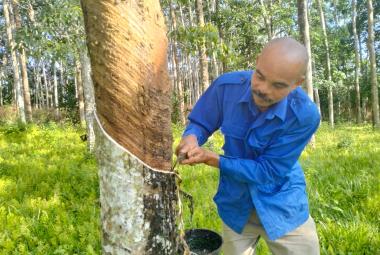By ZAIDI ISHAM ISMAIL
A lot of debate has taken place over the past few years on whether it is feasible to allow Lynas to operate here in Malaysia.
Many are concerned that the materials produced are radioactive and will be harmful to the environment and the rakyat.
Indeed, the rare earths industry is largely misunderstood.
But in a unprecendented move, Apple Inc announced last year that its new iPhones will use recycled rare earth elements in a key component for its latest iPhone 11 series.
The smartphone maker said it will use recycled rare earths in its "taptic engine," which is the phonemaker's technology that provides tactile sensations in the form of vibrations to users of Apple watch, iPhones and iPads.
This is possibly the first time that any recycled rare earth materials have been used in a smartphone.
Lisa Jackson, Apple's vice president of environment, policy and social inititaives had said Apple's use of recycled rare earths would help it maintain a steady supply.
This piece of news which is a first by Apple or any technology company, will certainly take the weight off Lynas's shoulders.
The announcement by Apple is a positice development as this will pave the way for rare earths to be a recyclable material.
This by itself is a good fit for the environment, of which rare earths came from the earth, go back into the earth to be recycled and be reused again making it a sustainable element.
Rare earths is not a threat and former Prime Minister Tun Dr Mahathir Mohamad did the right thing to extend Lynas's license last year.
This new innovation by Apple will be a plus point for Lynas to recycle its rare earths so that its waste will not be harmful to Mother Nature.
This revolutionary breakthrough will ensure Lynas's ability to supply a steady stream of rare earths to industries all over the world.
Lynas will also be able to strategise how to sustainably mine its rare earth deposits.
Academy of Sciences fellow Dr Ahmad Ibrahim reportedly said that waste from Lynas contains phosphates which Malaysia imports a lot every year for our oil palm plantations.
"We should on the conversely, use these phospates from Lynas rather than importing enabling us to save high import costs," said Ahmad.
Ahmad said rare earth waste from Lynas can also be converted into wealth as essential fertilisers to the oil palm estates in the country.
Ahmad had said that equating rare earths to nuclear type waste is just plain irresponsible.
"They are miles apart. If not, why is China, a major world producer of rare earths, is not much bothered by the operations of their numerous rare earths plants?"
Indeed rare earths has proven to be an extremely stratgic material for the world in this era of digital economy and the Fourth Industrial Revolution.
Rare earths is emerging to be a technologically advanced product for the new global economy and it is in our interest to have good access to rare earths supply.
This new technology is the driver of the future and investors will shift away from the industrial parks of Penang which is now a sunset industry.
Rare earths technology will attract foreign direct investment and bolster technology to new heights.
The rare earths industry is here to stay as it is used in over 1,000 downstream activites.
Apple's move which was a first for the industry will open new doors and make an impact as rare earth elements aren't being recycled right now and that is a huge problem.
Kyle Wiens, the chief excutive of iFixit, a company focused on repairing and reusing Apple said China has a stranglehold on virgin rare earth supply and Apple could have single handedly created a huge market for recycled rare earths.
Apple is experimenting with ways to recover rare earths from its phones using robots which can remove tiny parts to make recycling of rare earths possible.
By using more recycled material, Apple is avoiding excessive mining from the earth.
Rare earths is a group of 17 specialised minerals such as lanthanum and scanium which are used in weapons, consumers electronics, smartphone speakers and actuators, rechargeable batteries for products such as computers, monitors, televisions, electric and hybrid cars and superconductors.
To allay environment concerns, Apple had said it will tap recycled rare earths from an outside supplier and not previously used iPhones.
It is hoped that Apple's move will inspire other smartphone makers and other industries to follow suit and redeem Lynas's battered image. - DagangNews.com
Zaidi Isham Ismail was formerly a Business News Asst Editor of NST










